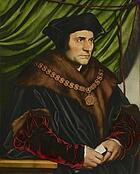
Thomas More, also known by his Castilian name Thomas More, or by his Latin name Thomas Morus and venerated by Catholics and Anglicans as Saint Thomas More (London, February 7, 1478-ibidem, July 6, 1535), was a English thinker, theologian, politician, humanist and writer, who was also a poet, translator, Lord Chancellor of Henry VIII, professor of law, civil business judge and lawyer. His most famous work is Utopia, where he seeks to relate the organization of an ideal society, settled in an island-shaped nation of the same name. In addition, Moro was a major detractor of the Protestant Reformation and, especially, of Martin Luther and William Tyndale.
In 1535 he was prosecuted by order of King Henry VIII, accused of high treason for not taking the antipapist oath against the rise of the Anglican Church, opposing the divorce with Queen Catherine of Aragon and not accepting the Act of Supremacy, which declared the king as head of this new Church. He was found guilty and received a death sentence. He remained in prison in the Tower of London until he was beheaded on July 6 of that same year. Moro was beatified in 1886 and canonized in 1935, along with Juan Fisher, by the Catholic Church, which considers him a saint and a martyr. For its part, the Anglican Church considers him a martyr of the Protestant Reformation, including him, in 1980, in its list of Christian saints and heroes.




